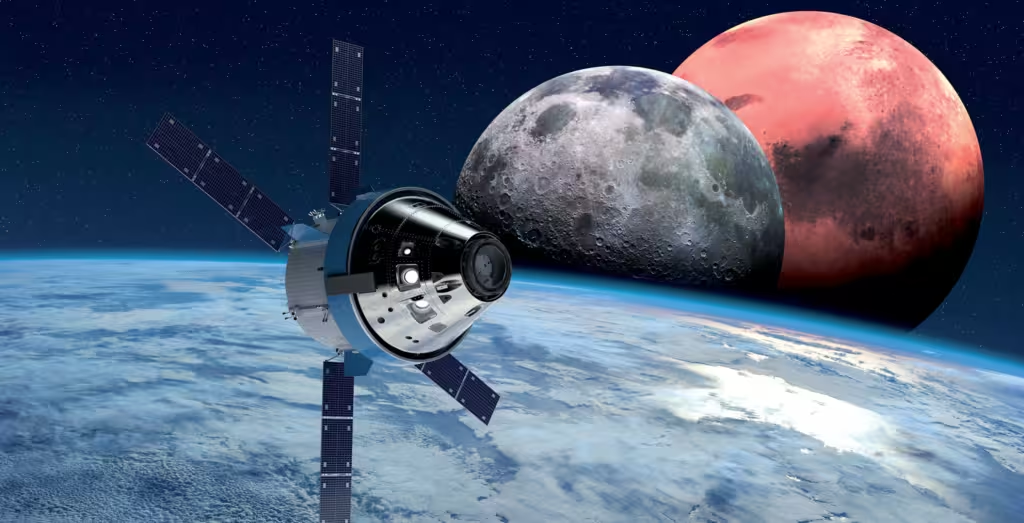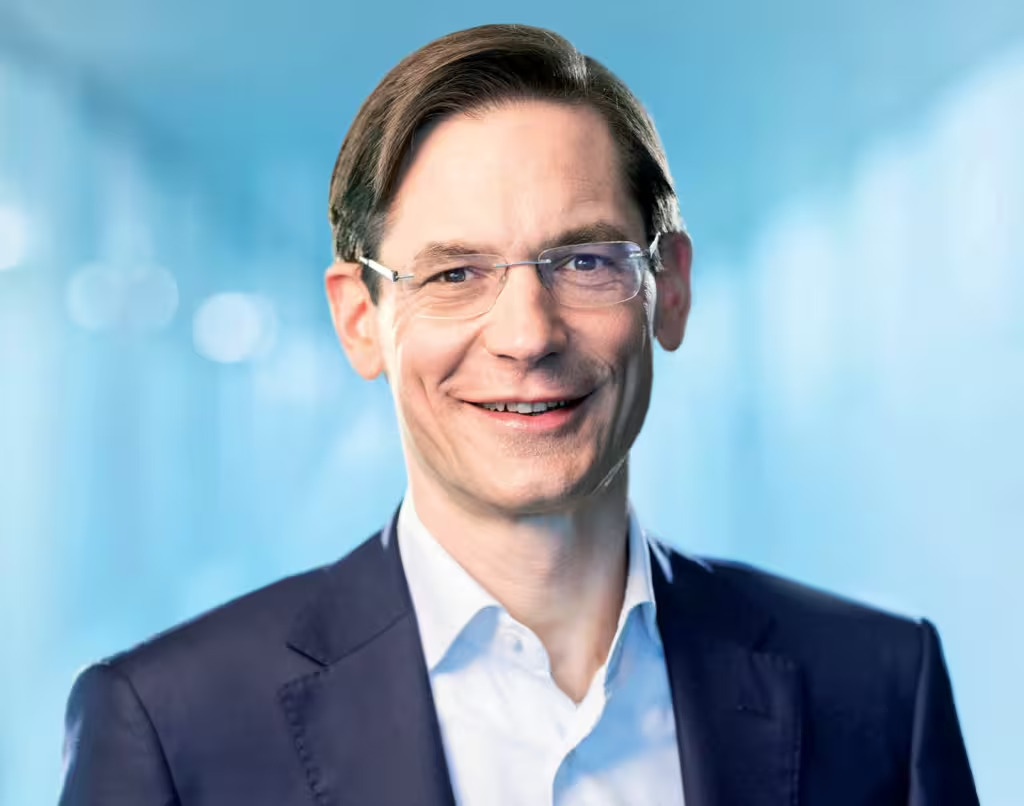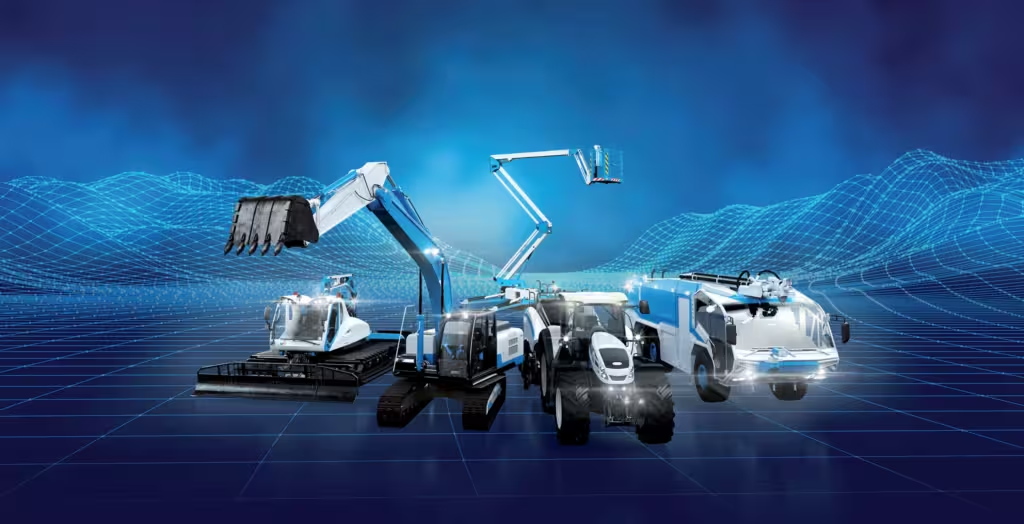
A spin-off of the Vienna University of Technology became one of the leading domestic companies in the aerospace and aviation sectors.
Network and control technology from Austria not only makes spacecraft, rockets and the future space station Lunar Gateway safe, but is also used in aircraft - such as the Airbus 380 and the Boeing Dreamliner -, in wind turbines and in cars. CEO and founder Georg Kopetz founded the Vienna company TTTech in 1998 together with his father, a well-known computer scientist, and Stefan Poledna, a former student of his father. A technology success story.
TTTech is dedicated to a wide range of business areas, from aerospace to wind power to IoT solutions. How did such a broad portfolio come about in the more than 25 years since the company was founded?
Georg Kopetz: As the name TTTech suggests, we are a technology company. A group of technology companies has emerged from one technology, all of which have a common approach to reliable networking and secure controls. Network technology, which is familiar from telecommunications, is about the communication between computers in machines or their applications, which cannot be seen at first glance from the outside. For example, a large number of systems are installed in aircraft and spacecraft that communicate and control each other. This type of reliable network technology is one of TTTech's strengths. Another important topic is the associated secure control technology. The control and the network are therefore closely linked in the world of intelligent machines. For 200 years, we have increasingly arrived in this machine world, which is now facing another revolution due to advancing automation - increasing autonomy; this more autonomous way of working offers help and support for people. Ultimately, it is about the productivity of work processes and in the economy, and productivity is the driver of prosperity and national wealth. We are trying to use our secure networks and secure controls to increase the productivity of machines and thus increase general prosperity.

You talk a lot about security and you have reference projects in many industries – is that particularly relevant?
Kopetz: Over the past 20 years, the topic of reliability and safety has become significantly more important in the general world of machines. In English, both security and safety are synonyms for the German word security. Safety actually means that people are not harmed in the event of a system failure. Security means that no one can hack, take over or otherwise negatively influence a system from the outside. Security, i.e. secure networks and controls, is a core competency of our company. TTTech holds an important market position here, and we always try to stay at the forefront in the area of security. This also has a lot to do with the issue of certification and the further development of various security standards. Space and aviation is certainly an area that particularly stands for security, because computers there should always function reliably. But reliability is also relevant in other areas: If you develop and build autonomous machines, they should not suddenly stop in the field or on a construction site because a security problem has arisen. Due to the increasing trend towards automation and the autonomization of machines, the topic of security is becoming increasingly important in both aspects of safety and security. That is why we cover this wide range of topics and have built up the relevant application knowledge. By working on applications and solving problems, TTTech in 1998 has developed into a variety of associated technology companies that operate in a wide range of markets: aerospace technology, industrial automation, but also TTControl in the special machinery sector and TTTech Auto in the automotive industry.
In the past, the world of computers and machines was separate. There was a paradigm shift here, and TTTech was right in the middle of it.
Kopetz: We are a proponent of this development because we believe that many industrial companies are becoming or are software companies, even in their core processes and core products, especially in the age of artificial intelligence. Every company can create a huge amount of value in its business model and for its customers with its data and digital know-how. This is often already established today. The challenge is that some of our customers in certain business areas do not have the structure to employ large software development teams. New topics such as safety and cybersecurity, cloud and machine automation in particular mean that there is a great need for competent technology companies.
Such technologies are more likely to be found in Silicon Valley, at NASA or Boeing. Why do such solutions come from Austria?
Kopetz: Technology is always international and here we are involved globally in many topics. Our advantage is that we are a spin-off of a long-term development that began in Austria at the Vienna University of Technology. My father was a professor at the Vienna University of Technology and head of the Institute for Technical Computer Science and Reliable Computer Systems.
So your family environment influenced you?
Kopetz: Yes, my father is also a co-founder of the company and my third co-founder, Stefan Poledna, also came from this institute. There is a strong scientific basis here, which has been promoted accordingly in Austria for many years. There is also a lot of know-how in the European Union when it comes to machine technology. Airbus is a good example and was also the midwife of TTTech, because we emerged from an EU project in which Airbus was an important partner. Our first project in the aviation sector concerned the Airbus 380, for which we were able to supply and use the chips for the first time, which are also produced in Austria, at ams Osram in Unterpremstätten. The Europeans are at the forefront of machine technology worldwide. We knew from the start that TTTech had to assert itself globally and could not be a regional player and limit itself to the DA-CH region. That is why we set up our first branches in the USA and Japan in the second year after our founding, because we have to be where our customers are. As a small, open economy, Austria is predestined to have a global perspective. Vienna as a location in particular has the advantage that customers are happy to come to Austria and can easily do so thanks to good flight connections. The supporting program of art and culture is also good. Austria must and will play a global role in the technology sector. There are extremely good mechanical engineering companies in the country, such as Palfinger, which we are proud to count among our customers.

Where are TTTech components used and why are your products outstanding here?
Kopetz: The technology itself is communication protocols and control software. You can't see that. We noticed that we had to develop our own chips for certain industries, which we had manufactured in both Europe and the USA. It turned out that for certain applications, chips and software were not enough, because customers wanted a subsystem, electronics. So we started developing control units, where we supply not only chips, software and electronics, but also housings and connectors. We feel comfortable there, because in some areas the quantities are not so large that you can achieve enough added value with chips alone. Most customers prefer to buy a whole system, i.e. chips, software and system hardware.
In which areas is there a lack of funding for research and development in Austria?
Kopetz: There is sometimes a lack of courage to quickly turn ideas and technologies into products. Value creation is not achieved through subsidies, but through the sale of products at a good price and through satisfied customers who use the products. Today, we are facing several technology cycles when we talk about the electrification and automation of machines or the networking of machines with the cloud. This requires high levels of investment on all sides. There is also a lack of capital strength here, as not so much is financed with equity in Europe. Austrians sometimes prefer to keep their money in savings accounts and bonds and invest less in stocks in the technology sector. This puts us a little financially handicapped in Europe.
Is going public an issue for TTTech?
Kopetz: This has always been a topic, but the opportunity has not really arisen yet. There is no easy way to go public. There are many requirements that you have to meet in order to be a good candidate for public listing. The environment is also important. I am very much in favor of creating a European technology stock exchange and moving away from purely national thinking through a strong European capital markets union.
What goes through your mind when you think about your components flying to the moon or Mars?
Kopetz: That is very inspiring. We have already supported a mission to the moon and several orbits of the moon with our technology. It is always great to see that a technology that we have developed is also implemented. That gives us a lot of motivation to keep going. We are of course extremely fascinated by the vastness of space and we are working very intensively on the NASA Artemis program and the corresponding moon missions. Artemis is a program for the next generations that includes more than just spacecraft, but also a space station in lunar orbit and other activities on the lunar surface and exploration, perhaps even as far as Mars. We are working on a central building block, namely the data network of the Lunar Gateway station and the NASA Orion space capsule, in which we are using our core technology. But the new European launch vehicle generation Ariane 6 or an aircraft project, when it takes off and flies, are also a great motivation. It is always particularly exciting when you sit in the aircraft yourself, such as in a Boeing 787 Dreamliner or an Airbus 220 or 380, and you know that TTTech components are used there.
It's a big leap from space to Earth. How did TTTech get into the renewable energy business?
Kopetz: I am personally influenced by my uncle Heinz Kopetz, who is considered a pioneer of sustainability in Austria. He wrote books about sustainability as an economic principle 40 years ago. The topic is extremely important for humanity and Europe, as we do not have a Planet B. Every company must ask itself what it is doing to solve the problem of limited resources and reduce high CO2 emissions. The topic is interesting for us from various aspects. There are customers who work in the field of sustainability, such as Vestas, a global market leader in wind turbines, which produces electricity for millions of households every day using wind power. Vestas uses control systems from TTTech. We have also been involved in the electrification of various machines, such as Rosenbauer's hybrid fire trucks. We are currently also focusing on the topic of decentralized energy management. Due to the strong expansion of renewable energies, especially photovoltaics, the growing number of charging stations and the installation of batteries and heat pumps, there is an increasing need for robust, grid-friendly management of the interaction of these elements. We see a major role here for secure software, secure software solutions, secure controls and secure networks. We are currently preparing TTTech's market entry into this area and want to become at least a European champion.